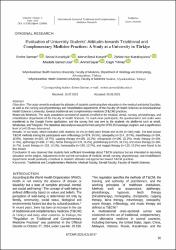Evaluation of university students' attitudes towards traditional and complementary medicine practices: A study at a university in Türkiye

View/
Access
info:eu-repo/semantics/openAccessDate
2023Author
Sarman, EmineKocabıyık, Sevval
Karacıf, Merve Betül
Karakoyuncu, Zahide Nur
Ucar, Mustafa Samed
Sayar, Ahmet
Yılmaz, Çağrı
Metadata
Show full item recordCitation
Sarman, E., KOCABIYIK, Ş., KARACİF, M. B., Karakoyuncu, Z. N., Ucar, M. S., Sayar, A., & YILMAZ, Ç. (2023). Evaluation of University Students' Attitudes towards Traditional and Complementary Medicine Practices: A Study at a University in Türkiye. International Journal of Traditional and Complementary Medicine Research, 4(2), 50-57.Abstract
Objective: This study aimed to evaluate the attitudes of students continuing their education in the medical and dental faculties, as well as the nursing and physiotherapy and rehabilitation departments of the Faculty of Health Sciences at Afyonkarahisar Health Sciences University, towards traditional and complementary medicine (T&CM) practices. Materials-Methods: The study population consisted of students enrolled in the medical, dental, nursing, physiotherapy, and rehabilitation departments of the Faculty of Health Sciences. To reach more participants, the questionnaires and scales were transferred to the Google Forms application, and the survey link was sent to the students via platforms such as email, WhatsApp, and Telegram. The statistical data analysis was performed using the SPSS 25.0 package program, and a significance level of p<0.05 was determined. Results: In our study, which included 1085 students, 64.1% (n=695) were female and 35.9% (n=390) male. The best-known T&CM methods among the participants were reflexology (n=374, 34.5%), osteopathy (n=214, 19.7%), mesotherapy (n=204, 18.8%), hypnosis (n=203, 18.7%), cupping therapy (n=196, 18.1%), chiropractic (n=196, 18.1%), music therapy (n=194, 17.9%), apitherapy (n=188, 17.3%), herbal therapy (n=176, 16.2%), prolotherapy (n=175, 16.1%), and ozone therapy (n=160, 14.7%). Leech therapy (n=153, 14.1%), homeopathy (n=149, 13.7%), and maggot therapy (n=110, 10.1%) were found to be less known. Conclusion: It was observed that students lack sufficient knowledge about T&CM practices but are interested in receiving education on the subject. Adjustments to the current curriculum of medical, dental, nursing, physiotherapy, and rehabilitation departments would positively contribute to students' attitudes and approaches toward T&CM practices.















